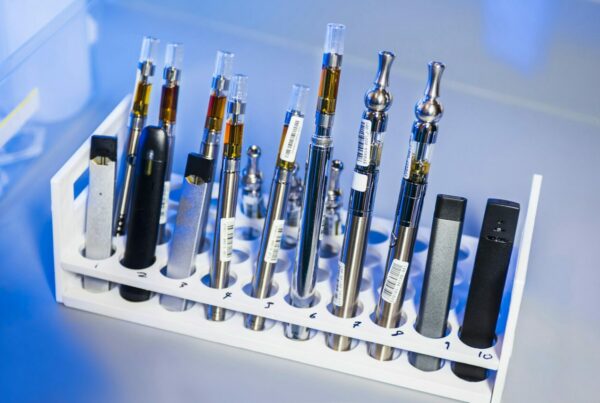N, N-Dimethyltryptamine (DMT) is a compound commonly found in both flora and fauna, known for eliciting intense, albeit short-lived, psychedelic experiences when ingested.
Emerging evidence implies that DMT, which naturally occurs in the human body, plays important roles in the peripheral and central nervous systems, possibly serving as a neurotransmitter.
DMT can produce strong psychedelic effects, yet it typically doesn’t result in many harmful effects, apart from potential cardiovascular problems when large doses are administered via injection.
Let’s explore DMT and its diverse functions. These range from recreational usage to its intriguing potential in scientific research and therapeutic purposes.

A Brief Introduction to DMT: What is it?
| Aspect | Details |
| Name | N, N-Dimethyltryptamine (DMT) |
| Classification | Indole alkaloid |
| Occurrence | Naturally found in a variety of plants and animals |
| Psychoactive Effects | Produces intense, yet brief, psychedelic experiences when ingested. |
| Method of Consumption | Can be smoked, injected, or ingested orally. |
| Duration of Effects | Short duration, typically lasting between 5 to 30 minutes. |
| Chemical Structure | Composed of a tryptamine core with two methyl groups attached to the amine nitrogen atom. |
| Metabolism | Rapidly metabolized by the body, degraded by monoamine oxidase (MAO). |
| Cultural Use | Historically used in various ceremonial and shamanic rituals by indigenous cultures. |
| Other names | Dimitrifantasiabusinessman’s tripBusinessman’s special45-minute psychosisspiritual molecule |
The Role of DMT in Mental Health
N, N-Dimethyltryptamine (DMT), a compound known for its potent psychedelic effects, is garnering attention for its potential benefits to mental health. Despite its conventional association with profound visionary experiences, recent research suggests a connection between DMT and mental well-being.
Effects on Psychological and Emotional Enhancing Well-being
DMT, a known psychedelic, is renowned for evoking deep emotional experiences and altering states of consciousness. These attributes could potentially pave the way for innovative therapeutic methods to address mental health disorders, aid in emotional processing, and offer new perspectives on personal traumas.
Influence on Neuroplasticity and Brain Function
Research suggests that DMT might influence neuroplasticity, thereby enhancing the brain’s ability to adapt and reorganize. Investigating its impact on synaptic plasticity and neural connectivity could reveal potential treatment options for disorders associated with neural maladaptation.
Prospective Therapeutic Applications for Mental Health Conditions
Initial research underscores the potential of DMT in treating disorders such as depression, addiction, and PTSD. Its ability to induce mystical or spiritual experiences could offer a unique strategy for psychotherapy and help in transforming negative thought patterns.
Studying the natural presence of DMT in the human body highlights its significance in promoting mental health resilience, managing stress responses, and fostering overall psychological well-being. Understanding how the body controls internal DMT levels may lead to the development of innovative therapeutic strategies.
DMT’s Role in Mental Health Disorders
| Mental Health Disorder | Description | Effectiveness of DMT | Advantages |
| Depression | Depression is a mood disorder characterized by persistent sadness, lack of interest, and decreased motivation. | Initial research suggests that DMT could potentially alleviate symptoms by provoking intense emotional experiences. | Its rapid onset and capability to initiate transformative experiences may offer novel therapeutic approaches for altering negative thought processes and enhancing emotional processing. |
| Post-Traumatic Stress Disorder (PTSD) | A mental health condition triggered by traumatic experiences, resulting in flashbacks, severe anxiety, and intrusive thoughts. | Preliminary research indicates DMT’s potential to manage symptoms by inducing spiritual or mystical experiences, aiding patients in reshaping traumatic memories. | The capacity of DMT to induce altered states of consciousness may facilitate emotional processing and offer fresh perspectives on traumatic experiences. |
| Addiction | A complex disorder characterized by a compulsive need to engage in rewarding stimuli despite adverse consequences. | Some research suggests that DMT could disrupt addictive behaviors and reduce substance cravings. | DMT’s ability to provoke profound and transformative experiences may assist individuals in modifying their behavioral patterns and addressing underlying factors of their addiction |
Approach to DMT Usage
DMT, recognized for eliciting short, yet profound psychedelic experiences, can be utilized in a variety of ways. The mode of delivery often hinges on the desired intensity and duration of the trip.
Inhalation:
When inhaled through a pipe or vaporizer, DMT needs careful heat management to avoid scorching the compound. The psychedelic effects manifest almost instantly when DMT is inhaled, usually lasting from 5 to 15 minutes.
Oral Consumption:
Consuming DMT orally leads to slower onset of effects that endure considerably longer, often for several hours. This is attributed to the slower metabolization of DMT when used with an MAOI.
Injection:
DMT can be injected directly into the bloodstream for rapid and intense effects.
This technique yields an immediate and powerful experience, but it necessitates precise dosage and carries higher risks.
Insufflation (Snorting):
Snorting DMT results in slower onset of effects compared to inhalation but can provide a more prolonged experience.
Sublingual or Buccal use:
When absorbed through the tissues of the mouth, this method offers an alternative to inhalation and offers a longer, though less potent, experience.
Determining Therapeutic Dosage: N,N-Dimethyltryptamine (DMT)
For inhalation, the suggested dosage ranges from 20 to 40 mg, while for intravenous use, the advised dosage is 0.2 to 0.4 mg per kg of body weight. These dosage recommendations are primarily aimed at clinical research, particularly for intravenous use.
- Higher doses administered intravenously are associated with vivid visuals, temporary loss of control, and a mixed state of anxiety and euphoria
- Fascinatingly, lower doses have exhibited less desirable effects
- Leisure use doses of inhaled DMT usually range from 40 to 50 mg, sometimes even climbing up to 100 mg
- Various doses of intravenous Those who have had near-death experiences related to DMT (7, 14, 18, and 20 mg solutions) have reported significant and enduring enhancements in their psychological well-being.
Availability of DMT
ProductsOsmosis – Ethereal Essence 4-ACO-DMT Tincture
This tincture is marketed as containing 4-Acetoxy-N, N-dimethyltryptamine (4-AcO-DMT), a variant of DMT. Tinctures are liquid extracts intended for oral intake, and this particular product may offer a distinct experience compared to standard DMT.
Lucid Supply Co. – 5-MeO DMT Vaporizer
This product is a vaporizer that delivers 5-Methoxy-N, N-dimethyltryptamine (5-MeO-DMT). Known for its potent, transformative, and often brief experiences, 5-MeO-DMT is the active component.
Integral Alchemist – Acacia – 1ml DMT Vape Cartridge
The DMT vape cartridge from Integral Alchemist comes pre-loaded with N, N-Dimethyltryptamine. This product is likely designed for those who prefer a discreet and convenient method of DMT administration.
Deadhead Chemist – 5-Meo-DMT Cartridge
This cartridge contains 5-Methoxy-N, N-dimethyltryptamine (5-MeO-DMT), a compound known for its deep and powerful effects.
Potential mental health benefits could be linked to personal growth, spiritual experiences, or therapeutic applications aimed at enhancing emotional well-being.
Deadhead Chemist – N, N DMT Cartridge
This separate product from Deadhead Chemist contains the traditional N, N-Dimethyltryptamine. Cartridges provide a user-friendly method for DMT consumption, ensuring a more consistent and controlled experience.
Concluding Remarks
The consumption of N, N-Dimethyltryptamine (DMT) in
How to find reliable DMT products?
It’s important to source your DMT products from trusted providers such as Mushroom Dispensary Canada Online Dispensary, which can offer reliable guidance and a variety of options for responsible exploration.
Frequently Asked Questions:
How do different DMT products impact mental health?
For instance, vaporizers may have rapid effects, while tinctures or vape cartridges can offer more controlled and consistent doses.
Using DMT derivatives or 5-MeO-DMT can result in varying intensity levels and different mental health effects.
The need to choose a DMT product based on personal preferences and mental health goals is underscored by these subtle differences.
Can DMT lead to enduring changes in mental health and personal growth?
Anecdotal evidence suggests that DMT-induced experiences could create lasting effects on mental health and personal development.
Deeply transformative or profound experiences, such as those resembling near-death experiences, are frequently associated with continuous positive changes in psychological well-being and personal growth.
Although these experiences are intense and brief, they frequently lead to introspection, spiritual revelations, and a sense of unity or enlightenment.
Following these experiences, individuals often report a refreshed perspective on life, improved emotional resilience, and a heightened appreciation for existence.
What is the optimal approach to using DMT for mental health?
It’s essential to make well-informed decisions, which includes thorough research and understanding of the compound’s effects.
Advice from mental health professionals or experienced users can provide valuable information about potential risks and benefits.
Knowing your personal tolerance and mental preparedness is also essential, along with creating a supportive and safe environment for the experience.
How is DMT different from other psychedelic treatments like psilocybin or LSD in mental health therapy?
DMT’s effects, duration, and intensity are distinct from other psychedelics such as psilocybin or LSD. It is specifically known for its shorter duration.
High-intensity, short-acting psychedelics like DMT demand unique therapeutic strategies in mental health, which are different from the ones used for longer-lasting psychedelics.
Recommended Further Reading:





